The Sixth Sunday in Ordinary Time ~ an essay
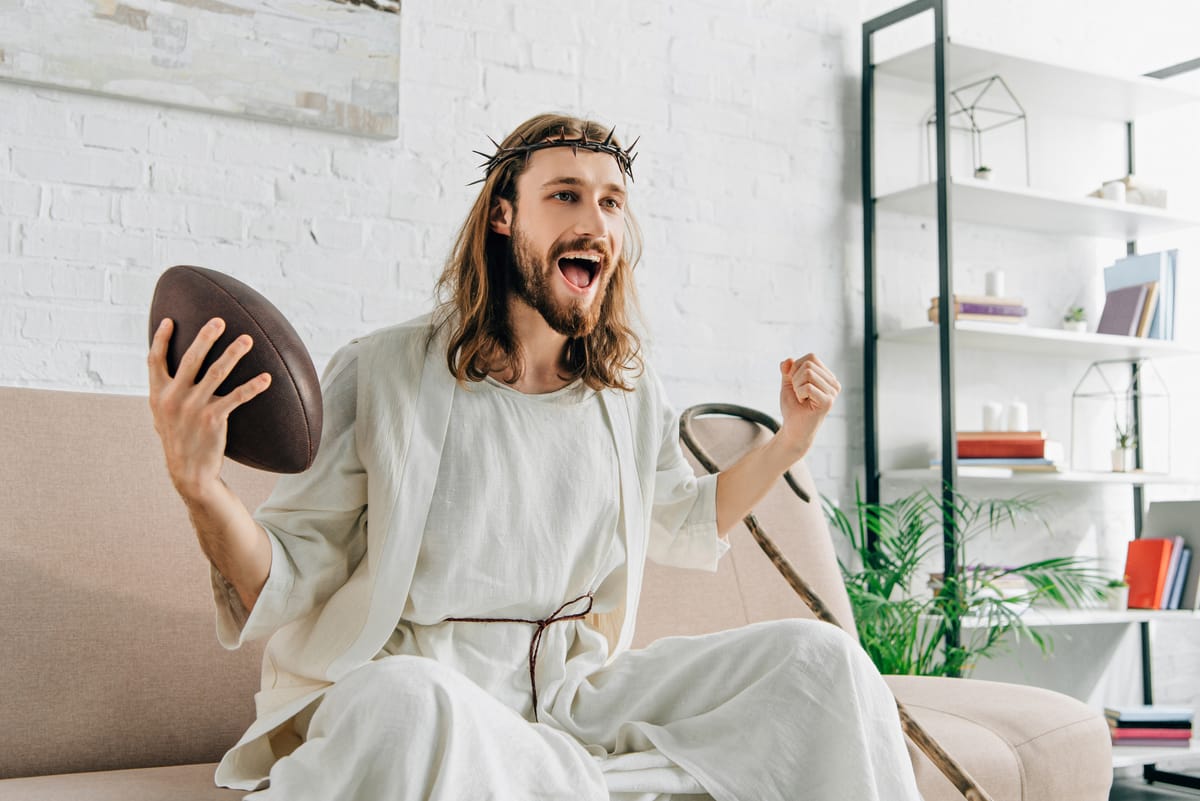
The Catholic Church breaks the liturgical calendar up into six seasons: Advent, Christmas, Lent, Sacred Paschal Triduum, Easter, and Ordinary Time. With 34 weeks in Ordinary Time, that one season makes up the majority of the calendar. Using sports terminology: Ordinary time is the regular season; Advent and Lent act as the playoffs; the Sacred Paschal Triduum, the semi-finals; which makes Easter and Christmas the championship games. The liturgical calendar covers one entire calendar year and runs from November to November. What is simply bookkeeping, can seem to an outsider, like convoluted nonsense. I have even leaned into this myself, asking people an insane question – “How’s your Thirty-third Sunday in Ordinary Time going?” – for a laugh.
The National Football League breaks up their schedule into seasons as well: preseason, regular season, and postseason. Preseason lasts 3 weeks. Regular season goes on for a grueling 18 weeks. And while the postseason consists of 5 weeks, one weekend has no actual football games. Using religious terminology: the Super Bowl is the NFL’s, and America’s, version of Easter and Christmas combined. The NFL’s schedule covers 26 weeks, which is half of a calendar year, and runs from late-August to early-February. Again, to an outsider, the intricacies of this can feel overwrought and unnecessary.
In the year of the Lord two-thousand and twenty-four, the Sixth Sunday in Ordinary Time and Super Bowl Sunday both fell on February 11th. With that in mind, I wanted to perform a thought experiment: would there be any direct or thematic overlap between these two unrelated events? So, I decided to examine this unlikely collab, this strange mashup. What follows are my reflections on the connections, emotions, and takeaways of that day.
Entrance
My mind constantly churns and I wear my emotions on my face. Thoughts accumulate in my head, and I do not let go of them easily. The walk from where I live to St. Raphael Catholic Church in Morningside — left on Baker, downhill three blocks, right on Chislett — takes me all of seven minutes and can be sufficient time to shed what’s on my mind before Mass. On that morning, I just kept stuffing more and more up there, filling the crevices. My puffy bomber jacket swished as I swung my arms. My new watch, which wasn’t keeping time correctly, chafed my wrist, the canvas strap not yet broken in. I’d been finding more strands of hair than usual on the bathroom floor. My brother was looking for land back in Pittsburgh, contemplating a move. All of these thoughts were going on at the same time.
The weather was somewhat pleasant for a grey winter morning — the low sun found pockets in the dense clouds — but I barely noticed it. Mourning doves called out mournfully. Blue jays screamed from the bare branches. The church bells, now an electronic sound system affixed to the limestone building, squawked their pitchy song. A gang of sparrows, the rowdy ruffians of the neighborhood, swarmed a feeder, and then bolted off like the alarm on it had already been tripped. My own breakfast had been bacon left over from the set of a television show, pasture-raised eggs purchased at Whole Foods, which had been swallowed by Amazon, and a pour-over coffee: hand-ground beans in a 40% caffeinated, 60% decaf ratio. Full-caff made me jittery. I still had the jitters. A woman walked by with her dog on a hands-free leash, a smartphone in one hand, a bag of dog feces in the other, and said, “We have this great, untapped opportunity to use this ballroom…”
Instead of letting all of these sensations bring me back to reality, I was storing them atop all of the other garbage. I even pulled out my own phone to make a note of what that woman said before my steps took me out of earshot of her conversation. While my head was down, the lowest branch of a nonnative tree scratched across my forehead and prompted me to put my phone away, to pay attention.
However, one thought screamed louder than all the rest: today was Super Bowl Sunday. I knew I had to make a choice: was I going to celebrate this American holiday or was I going to do my best to ignore it? Super Bowl Sunday assaults the senses: no nuance, all volume. I told myself I didn’t have to have an opinion on anything. I didn’t have to react. I could take from the day what spoke to me most, what lifted me out of myself, what connected me to others, and let the rest fall away.
This debate raged on as I slipped into a pew just as the first chords of the opening hymn breezed through the organ. I lifted the Worship Hymnal, the thick red book in the pew, and turned to #835: God is Here! As We His People. For the thousandth time, I thought about how the words “worship” and “warship” were homonyms. Why did my mind do this?
The cantor powered through the song in the same manner that often makes my Mennonite fiancé cringe. The congregation did their best to join their voices in praise as a gaggle of Boy Scouts in their uniforms waddled down the center aisle, carrying a variety of flags.
A lyric: “Here the cross has a central place.” Amid the bright flags, an altar server carried a wooden cross. It was hard to see; I only caught a quick glimpse.
At the rear of the procession, an aging priest, a guest celebrant, made his slow journey toward the altar. I tried to ignore all of the random thoughts I’d brought with me, but a stream of them gushed before my mind’s eye: a rising tide. The music died down, ended. Somewhere in the church, a baby was crying, voicing its discomfort. By the looks on the faces around me, and how my own face felt, this infant spoke for all of us and confirmed Nietzsche’s critique of Catholics. Undeterred by the infant, the priest kicked off the Sixth Sunday in Ordinary Time with, “In the name of the Father, and of the Son, and of the Holy Spirit.”
And we, as one, responded, “Amen.” The game was now underway. It had started on time.
At that moment, something changed for me. I felt I could maybe choose hope for once. Maybe the day would surprise me, would coalesce into something verging on Reality[1] instead of just distracting us all from what really matters. Each year, the Super Bowl grows dimmer and dimmer, less enjoyable as a whole, more in conflict with my moral compass. But maybe this one would be different, maybe I’d glimpse a twinkle of some bright light if I gave it a chance. As the Grateful Dead once sang, “Once in a while, you get shown the light / In the strangest of places if you look at it right.”
Seated on my couch later that same day, I grabbed the remote control and pointed it at the television set, clicked power. A giant banner onscreen read that coverage started at 11:30 a.m. Eastern Time, which was six-and-a-half hours before kickoff. This seemed excessive, but I was going to give it a chance. I selected “watch” and pressed the button. Nothing happened. I tried it again. Nothing. I checked inside of the app instead of using the banner. There, it said that coverage began at 1:30 p.m. One extra one in this situation makes a huge difference. I’d just have to wait to begin my journey, to see the light.
Penitential Act
Each time I attend Catholic Mass, I’m struck by one aspect: it holds central, and mentions often, the idea of forgiveness. It urges everyone to forgive themselves, to ask God’s forgiveness, and, most of all, to forgive their neighbor. By design, it stresses that if you carry these burdens with you, you cannot achieve anything. These feel like near-impossible tasks, and I, as well as my fellow Christians, fail often. Still, I try and try and try again.
The priest leads us into the penitential act: “Brothers and sisters, let us acknowledge our sins, and so prepare ourselves to celebrate the sacred mysteries.” A pause. “I confess to almighty God…”
And the congregation jumped in with, “and to you, my brothers and sisters, that I have greatly sinned…” Normally, this fell from my lips, rote, but this time I thought about each word, and begged for the absolution it requested. I carried so much emotional and mental baggage with me. “…In my thoughts and in my words, in what I have done and in what I have failed to do...” I had made so many mistakes that weighed heavily on me. “…Through my fault, through my fault, through my most grievous fault…” I wanted to let go of it all. This prayer was giving me permission to, and made it feel like anything holy was unattainable if I didn’t. If I wanted to accomplish what I’d just told myself I wanted to do with the day, I’d have to release what I brought with me to the pew, but it felt like such a substantial part of my ego. How could I let go?
I just told myself to try again. To maybe not be so hard on myself if I didn’t let go perfectly. And with that, somehow, by the second “Lord, have mercy,” I felt lighter, stood a bit straighter, and took my first deep breath of the day, possibly the month. And we plowed on, into the Gloria.
I returned to the living room at 1:40, clicked the same banner. This time, the program responded. A different new graphic began to stream on the screen: two football helmets, one for the Kansas City Chiefs and one for the San Francisco 49ers, floated above, and were reflected in, a computer-animated fountain of water. Fake jets of CGI liquid leapt into the air in dazzling fashion before a large, ornate hotel in the background. The graphic attempted to capture the experience of being on the sidewalk in Las Vegas, where the game was to be played. Beneath all that, in the foreground, the graphic advertised who had sponsored, i.e. paid for, the upcoming show – and the graphic itself.
As the graphic pounced out at me with colors and motion, I failed to make sense of what I was seeing. It took me more than a moment to see the pertinent information in smaller print at the very very bottom. It said, “Coverage would begin at 2 p.m. ET.” Huh. Why was the earlier information wrong, twice? Was something causing these delays? Had something happened somewhere? Were they building tension? How could I be sure that 2 p.m. was the right time? I found myself wondering whose fault it was. I wanted somebody to blame. The penitential act from Mass popped into my head. I couldn’t be angry at whoever it was. I had to forgive them. But still, I wanted to know who it was that I was forgiving.
LITURGY OF THE WORD
First Reading
At 2:16, I dipped back in again and found that the content had indeed started. Three men in cocktail attire and leather athletic hi-tops spoke loudly, yet clearly, about their personal experiences at past Super Bowls. The harsh Vegas sun washed out most of the background, which consisted of the same fountain as the graphic and the brick-and-mortar Bellagio Hotel. Beneath frame and out of sight, rowdy hooligans shouted comments in the direction of the set, trying to insert themselves. The microphones picked up the sound of their voices, but the words were garbled and unclear.
As the congregation sat, the reader took the podium and spoke into the microphone, “A reading from the Book of Leviticus. The Lord said to Moses and Aaron, ‘If someone has on his skin a scab or pustule or blotch which appears to be the sore of leprosy…’”
The ex-NFLers in their noisy clothes did their best to ignore these loud interjections. The conversation downshifted as their mouths spoke a few obligatory statements: “Brought to you by…”, “Thanks to…”. Even the Bellagio Hotel was dutifully plugged before the feed transitioned to a more common advertisement about medication aimed to treat hypertrophic cardiomyopathy. These aggressive commercials by multinational pharmaceutical companies – with their aspirational images and healthy actors and sinister voiceovers listing side effects – are beyond normal on American television. These days, they seem to be the foundation on which broadcast companies stand. There are studies which prove that these advertisements both lead to over prescription and under prescription. Now, how is that possible? First, people often relate to the symptoms listed in these ads which can lead them to self-diagnose. Second, people that may actually need the medication hear the list of side effects and decide they don’t want to risk taking the drug. So, people are buying and taking the mediation, but not the right people. Over and under. I remember hearing at some point that America and New Zealand are the only two countries in the world where drug makers are allowed to market prescription drugs directly to consumers. Looking into this, I find that it is indeed true and has been since 1997 when the FDA relaxed its guidelines relating to broadcast media.[2] After an insurance commercial ended, another pharmaceutical company advertisement started. This one showed an actor acting embarrassed by red splotches on her body: psoriasis.
“The one who bears the sore of leprosy shall keep his garments rent and his head bare, and shall muffle his beard; shall cry out, ‘Unclean, unclean!’ As long as the sore is on him he shall declare himself unclean, since he is in fact unclean. He shall dwell apart, making his abode outside of the camp…”
As the actor mimed relief and the positivity in the visuals and soundtrack rose, the listing of side effects sped downward, from allergic reactions, to kidney failure, to death. The lasting image showed a smiling actor: their wardrobe revealed more healthy skin, their illness in decline, their life restored. And it only took thirty seconds.
Please don’t take my comments as cynicism. Believe me when I say that I am earnest about commercials. One, I’ve worked on the set of multiple commercials. Two, I work in television. I’ve written for a show that has been broadcast during primetime. Early in my career, I met a TV writer who said it bluntly, “I know I’m just selling trucks and medication.” Another producer quipped that the best thing he ever created faded to black before a hemorrhoid-relief commercial faded in.
Though advertising dollars – funneled through a network, funneled through a production company, funneled through a payroll company – have paid my rent and bought my groceries, I still mute the commercials. I can’t take the assault every eight or ten minutes. It’s too aggressive.
And for some reason I can’t not pay attention to them, to their production, their message, their insanity. Like most things, I overthink even these little nuggets of marketing that are mostly supposed to be forgotten, only the product name remembered. Instead of washing over me, like it appears they do to most people, I’m blindsided by them and can think of almost nothing else for the duration of the ad.
Thankfully, this set of commercials ended and the content returned. However, only a wheel at the center of the screen twirled. And twirled. The content struggled to load, grinded. Instead of returning to the three yelling men, I got an error message on the application: video unavailable.
I exited the stream, what else could I do, and decided to take a walk outside. Two hawks circled high above my quiet city street. This moment was brought to us by nature, I thought. The serene episode did a 180 when one hawk made an aggressive pass at the other. A third red-tailed hawk entered the mix: a tag-team partner of one of them. The lone hawk flew off, out of sight. The team gave chase, but the roofs of the houses downhill from me blocked my view of any additional drama.
“The word of the Lord.”
“Thanks be to God.”
Responsorial Psalm
Not finding the harmony with the pianist, the cantor abandoned singing the responsorial psalm after one syllable and did a spoken-word version of it: “I turn to you, Lord, in time of trouble, and you fill me with the joy of salvation.” The congregation dutifully responded, chanting, not singing. The piano fell away, the unseen pianist reacting to the last-minute change of plans, the audible.
After my walk, I couldn’t help but tune back into the pregame show; I was curious and trying not to constantly look away. An animated segment with an animated SpongeBob SquarePants singing some victory song began. Live-action highlights from NFL games that took place earlier in the season were intercut with the goofy visuals, all of it set to the pace of the music. Though some of the highlights were of passes, runs, and touchdowns, more than a lion’s share were of hard tackles, full-speed collisions, and players being thrown to the ground. The editing cut so quickly that a brain didn’t have time to make sense of what it was seeing. Violence without context.
“I turn to you, Lord, in time of trouble, and you fill me with the joy of salvation.”
Mercifully, SpongeBob wrapped up his song and the video switched back to real humans. The new segment showed Jason Kelce, a football player for a team not playing on Super Bowl Sunday, arriving to cheer on his brother, Travis, who was set to play. Jason, in bright red-and-yellow flannel-patterned overalls with the Kansas City Chiefs symbol on them, looked almost more animated and ridiculous than SpongeBob.
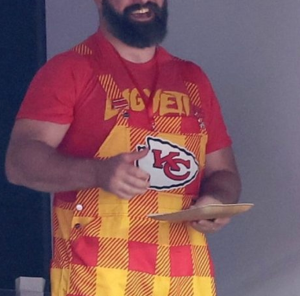
The video cut to his brother, who was arriving at the stadium for the game. Travis wore a glimmering pants-and-jacket combo made out of material that you would more likely find on Diana Ross than an NFL player. He kept his sunglasses on indoors, committing to the look. His wide-legged pants swayed with each step, but his bulky black leather satchel hung heavy and still from his right hand. Thick silver chains and earrings topped off his accessorizing.
“I turn to you, Lord, in time of trouble, and you fill me with the joy of salvation.”
The Twitter (now X) account for the Kansas City Chiefs posted video documenting his entrance alongside the words, “Killa Trav ready to shine”. Feeling trapped in this warrior culture, I turned off the pregame — that was enough for me — and I drove out to visit my parents, who live thirty minutes away in the suburbs of Pittsburgh: a place that has been called both “a football town with a drinking problem” and “a drinking town with a football problem.” Pittsburgh identifies with its teams and its teams’ players in the same way as Kansas City. In 1979, the Steelers and Pirates both won their respective championships. When the city replaced the fire hydrants the next year, “City of Champions” was carved into the mold. To this day, those words can be found on the cast-iron bonnets of many of the city’s hydrants. Once a champion, always a champion, I guess.
“I turn to you, Lord, in time of trouble, and you fill me with the joy of salvation.”
Cars were out in droves, the final preparations and travels to where people were planning to watch the game kept every engine running. The roads were full: Americans were excited for the show. I thought about how America has always loved a good circus, and would willingly travel for one. This hadn’t changed — and wasn’t going to. A few months prior, I’d stood in line for an hour to see a religious relic: an arm-shaped reliquary which held a fragment of an arm bone said to be from the St. Jude. It was touring the country and it was a big to-do for some. In that line, I had felt a connection with generations of folks who have gone out of their way to see the circus, to witness the freak show, to play at the fair, to find salvation, to attend the big game. I thought about why people did these things: maybe a mix of personal curiosity and herd mentality. And there’s always the hope that the next thing will be that singular life-affirming experience that connects us all to one another and to something even larger. It could happen. Could anyone be blamed for hitting up the supermarket for chips and dip while they waited for the Super Bowl to deliver that?
“I turn to you, Lord, in time of trouble, and you fill me with the joy of salvation.”
Second Reading
The lector tore into the second reading at Mass, Saint Paul’s letter to the Corinthians, “Brothers and sisters: whether you eat or drink, or whatever you do, do everything for the glory of God.” I followed along in the other book in the pew, the missal. Another homonym. “Missal” and “missile.” “Worship” and “warship.” I struggled to not follow this thread, to not get distracted.
Back on TV, the burly-yet-dapper owner of the Bellagio Hotel meandered through a glamorous dining area with large windows, greeted guests and staff alike, and attempted to connect Vegas to football in a vague way that I wasn’t quite understanding. Disguised as content, the tourism ad continued with shots of Elvis, Sinatra, and Wayne Newton. It ended out front of the Bellagio, by that large fountain in the desert, as the owner snapped his meaty fingers to the music. Cue water-feature porn.

The interviews that took place once the scheduled programming returned were stunted and terrible, in my opinion. The game was almost upon us. They were running out of things to say and have repeated the same things so often in the days leading up to the game that all emotion in the statements felt dulled. The talk went to Kelce once more and a comparison to Kellen Winslow Sr. was made. One jock-turned-reporter called Kellen “the patron saint of tight ends” without even a hint of irony. He meant it. In the eyes of those who worship the league, to succeed in the NFL is to become a larger-than-life figure, a superhuman, a legend, a saint.
Talk of Kellen Winslow Sr. made me think of an incident involving his son, Kellen Winslow Jr.[3] He made what’s called a crack-back block on a defender while matriculating at the University of Miami. He stood over the player he injured, which caused a reporter later in the locker room to ask him whether he knew he was gloating at an injured opponent. He replied, “Yeah. I don’t give a hell... He’d do the same to me. It’s war. They will kill you. They’re out there to kill you. So, I’m a kill him... I’m a f***ing soldier!” Most of the media, and even fans, denounced his outburst. He was vilified. People opined that it was just a game, that he needed to calm down, but I believe that his assessment of how it feels to be competing as an athlete in such a cutthroat league is spot on. It’s every man for himself out there. Announcers use the words “gladiators,” “warriors,” “soldiers,” and “players” interchangeably and no one bats an eye. The Chiefs’ PR folks were calling their own player “Killa Trav.” The Super Bowl logo is Roman numerals for God’s sake. This is the brand. This is intentional.
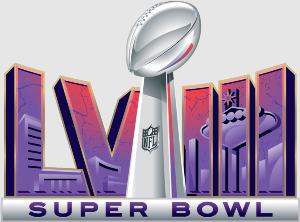
The NFL has also historically positioned itself next to branches of the United States Military. And vice versa. Service members of the armed branches of America’s military – real soldiers – are often shown, honored, and interviewed surrounding major NFL events like the Super Bowl. Fox once had its hosts broadcast from Bagram Air Field in Afghanistan during a game. In the past, the NFL has even accepted payment by various branches of the military to do on-the-field events and publicity in what has been called “Paid Patriotism.” This practice has slowed significantly since 2016, the year after Senators John McCain and Jeff Flake headed up a Joint Oversight Investigation looking into the practice and releasing a full report. The NFL then initiated its own internal audit and even paid back some taxpayer money as a result. Was it because they were acknowledging the problem, or was it for the optics?
However, the Department of Defense still advertises, nee: recruits, before, during, and after NFL games and events. The partnership continues to this day because it benefits both parties. The NFL wants to be seen as quintessentially American and flyovers and football-field sized American flags effectively link the two. The military spends considerable amounts of effort and money to recruit young men and women into their ranks. With the NFL’s soaring popularity, the military wants the eyes, and bodies, of this coveted demographic.
Still, the hypocrisy of the league constantly surprises me: all of this “warrior” talk comes out one side of their mouth while out of the other they talk of player safety, of changing the kickoff rules, of high-tech helmets that protect the players’ brains. By design, football is a violent sport that necessitates that meaty men crash into each other dozens of times over the course of four hours. The strongest, the fastest, the most aggressive, are the ones that most often get ahead. Yet injuries happen every game. Careers are ended. Lives are altered. And even those players who survive their whole career, lingering health issues wreak havoc on their bodies, their lives, and their families until they one day die. The league claims to care, to be doing something to limit the worst of these events. But their marketing constantly showcases the speed of the sport, the fun of the fight. In the fantasy land of a half-second clip, the collisions are exciting. In real life, these players are battling for their spot on the field, for their jobs, for the “glory” of victory, and all of that always comes at a cost to the individual, not the team. Each player is replaceable.
The words of St. Paul, a real saint, continued, “Just as I try to please everyone in every way, not seeking my own benefit but that of the many, that they may be saved. Be imitators of me, as I am of Christ.”
Gospel
The priest approached the lectern and began, “A reading from the holy Gospel according to Mark.”
“According to you, O Lord.”
“A leper came to Jesus and kneeling down begged him and said, ‘If you wish, you can make me clean.’ Moved with pity, he stretched out his hand, touched him, and said to him, ‘I do will it. Be made clean.’”
Live coverage from Las Vegas officially began and my family dutifully watched. A giant American flag unfurled, covering the majority of the green playing surface. Color guard behind her, Reba McEntire began singing the national anthem. The edit reveals much about the NFL: players and coaches standing on sidelines acting both reverent and not, camouflaged soldiers lined up at attention at Camp Carroll in South Korea, a Chief’s player unleashing dual tear drops, fireworks launching from the stadium’s dome, the Sphere immersive video-and-audio venue spiraling the colors of Old Glory, players swaying, Reba from various camera angles, and, finally, six fighter jets screaming across the blue desert sky and ejecting vapor trails of smoke. It was all there: the wholesomeness of country music, the strength and breadth of America’s military, Las Vegas’s psychedelic hedonism, and the NFL’s sales pitch that it was positioned at the center of it all.
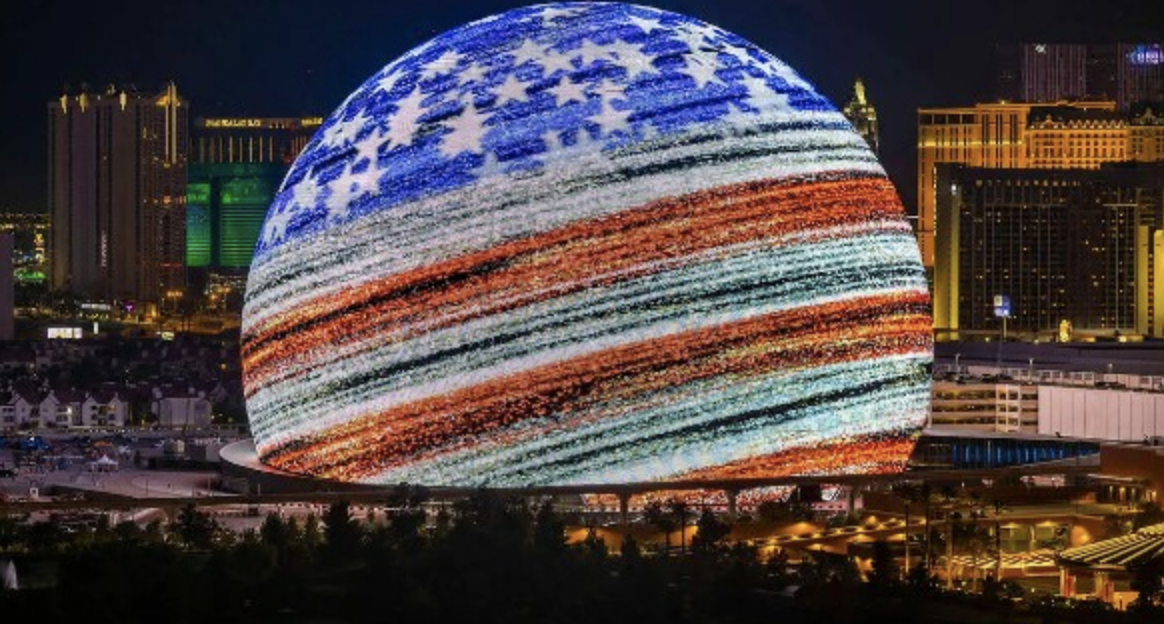
When Jesus cured the leper, he absolutely knew the earlier reading from the Book of Leviticus. It’s the third book of the Torah. He knew that lepers were not supposed to approach, were supposed to cry out, “Unclean, unclean,” so that others could avoid them. Instead, Jesus ignored the teachings of the Book of Leviticus, a book he was raised on, and allowed the leper to approach and even listened to the leper’s request. Jesus reached out his hand and touched the leper. With that gesture, he challenged the largest institutions of his day.
Jesus continued: “See to it that you tell no one anything, but go, show yourself to the priest and offer for your cleansings what Moses prescribed; that will be proof for them.” Jesus wanted to be caught, but not yet.
I’d made it through the national anthem, but just barely. All I’d seen to this point left me feeling shaken. But the actual game was about to start, kickoff was up next. I just needed to survive a few more commercials. I tried to ignore the fact that the movie trailers for upcoming blockbusters were all sequels. I tried to tune out the tone of shrill mania that intensified with each ad. Overload appeared to be their goal: ultra-processed candies and snacks, apartment- and home-finding websites, Jeff Goldblum. They didn’t come at us with a chisel, it was with a sledgehammer. I yearned for the game, for the on-the-field portions. If I could focus on the play on the field, the sport of it all, a sport which I had played in my youth, maybe it would change my perception of this spectacle. All of this pageantry and nonsense, it was all about the game, right?
Mark’s Gospel continued: “The man went away and began to publicize the whole matter. He spread the report abroad so that it was impossible for Jesus to enter a town openly. He remained outside in deserted places, and people kept coming to him from everywhere.”
Jesus was not at the game. He was outside in deserted places. All because he was dangerous to the status quo. He was going against what was law and he was amassing a significant following as a result. The Pharisees were concerned about their brand. Jesus wanted them to know that more was possible, but they had built such a monolith that they couldn’t accept anything that might change it fundamentally.
Homily
The priest powered into his homily. He thanked the Boy Scouts for bringing in their flags. He talked of Lent’s approach; Ash Wednesday was the upcoming Wednesday. He rambled off times for Confessions and Mass in the upcoming liturgical season. The first reading and the Gospel were both about leprosy so he recounted the bullet points of the story of Father Damian of Molokai. Born in Belgium, Father Damian traveled to a settlement in Hawaii in 1873 where 600 lepers lived in subhuman conditions. He aided the colony in any way he could and even lived among, and ate with, the sick residents. He treated them like humans, despite their illness and social standing. Father Damian of Molokai lived selflessly and risked his life so that others may live their lives with dignity.
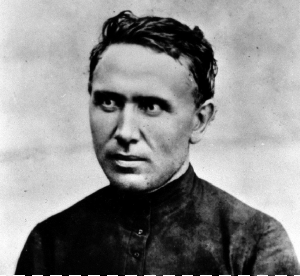
A star-studded commercial: Ben Affleck as Ben Affleck sings to J. Lo as J. Lo while Matt Damon as Matt Damon hides embarrassed off to the side and Tom Brady as Tom Brady pretends to play a keyboard. The men in this ad all wear matching Nascar-esque bright-orange coveralls with text and ads from neckline to ankle cuff. Tom Brady raises his fist into the air twice during the song and sings, “Dunkings!” The participants seem aware that they are embarrassing themselves to the point that every Matt Damon line of dialogue is about how he doesn’t want to be there, doesn’t want to be Ben’s friend, and wishes he wasn’t involved. These are the heroes of today, the role models.
Brands and companies pay these individuals because the American public respects, or at least acknowledges, them. Tom Brady finds himself in another commercial, in another comical outfit, as he hawks a gambling app available on smartphones. A user can bet the coin toss, the length of the national anthem, the final score, all from the comfort of their homes. And, better yet, if you just sign up and give them five dollars, they’ll give you hundreds more as a welcome bonus — like a good dealer. The NFL used to give gambling a wide berth, looking the other way on legitimate sports books (Vegas) and illegitimate ones (the guy in my dorm). Now, they’re watching their corporate value rise ever higher by entangling themselves with it more than ever. It started with fantasy football. That got millions of Americans more engaged with the ins-and-outs of professional football, especially since money and pride amongst friends, family, and coworkers was involved. Now, the NFL has taken it one step further. You are more invested in the NFL if you literally have money on the line. Something Hunter S. Thompson wrote in the Seventies, before I was born, rings in my ears as I see these ads. Hunter said it straight in his infamous article “Fear and Loathing at the Super Bowl” for Rolling Stone: “Even now, most of the games are so f***ing dull that it is hard to understand how anyone can even watch them unless they have some money hanging on the point spread.” I agree with Hunter on that one, and, I think, so does the NFL. This is one of my largest gripes about the NFL: I don’t enjoy the experience of watching a game as much as I used to. Injuries, penalties, commercials. Maybe I need to listen to Tom Brady and put some money on it, make it interesting. I try not to focus just on Tom Brady; if it wasn’t him, it would be some other player. So many ex-athletes are in commercials now, that the NFL seems to function as a mere farm system for future on-air and commercial talent. Get noticed on the field, ride out your retirement in ads for chips or insurance. Think about it, we will never be rid of the Manning brothers. Ever.
Unsurprisingly, Father Damian contracted leprosy 11 years into his mission, but continued to serve the native residents until he died in 1889. His charitable works receive recognition to this day. The priest meandered, connecting this story to that of what sin does to a soul. He then spouted thanks to the Boy Scouts in attendance and talked about how kindness, charity, and sacrifice were also central to their efforts. The priest stepped down and we all sang another song, asking the Lord to “open our eyes to the suffering of our neighbors” as the gifts were brought up to the altar.
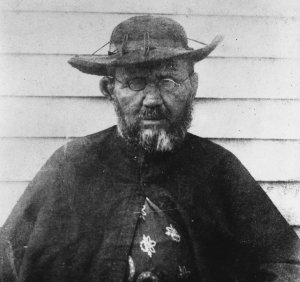
Intentions
The Mass continued with the intentions. Each mass, the congregation, led by a lector or the priest, presents requests before God: for guidance for the church, for elected officials, for peace, and for more. I kicked at a sticker on the tiled floor and leant down closer to get a better look while I listened. It was a Lil Brats sticker, and it was stuck. I was losing focus.
Until one intention asked God to “open our eyes to the suffering of our neighbors.” We all responded, “Lord, hear our prayer.” This kind of attention was what I was hoping to find in the world-at-large, but it didn’t seem like I would see this sort of message on television.
LITURGY OF THE EUCHARIST
Communion Rite
This section of the Catholic Mass mimics the events of Holy Thursday, which commemorates Jesus’s Last Supper and the Washing of the Feet. During the Last Supper, Jesus encouraged his disciples to continue the meal in perpetuity, saying, “Do this in remembrance of me.” Every Sunday, the priest at Mass performs this ceremony. One challenge a priest faces: how do you replicate the significance and power of anything you do over and over and over again? How do you avoid just going through the motions when it becomes a habit?
The other part of Holy Thursday, the Washing of the Feet, is not repeated every Sunday. At the Last Supper, Jesus washed the feet of his disciples, performing an act of humble service for them in order to demonstrate their purpose once they were left without him. When this religious rite is performed in a church, it is my second favorite service.[4]
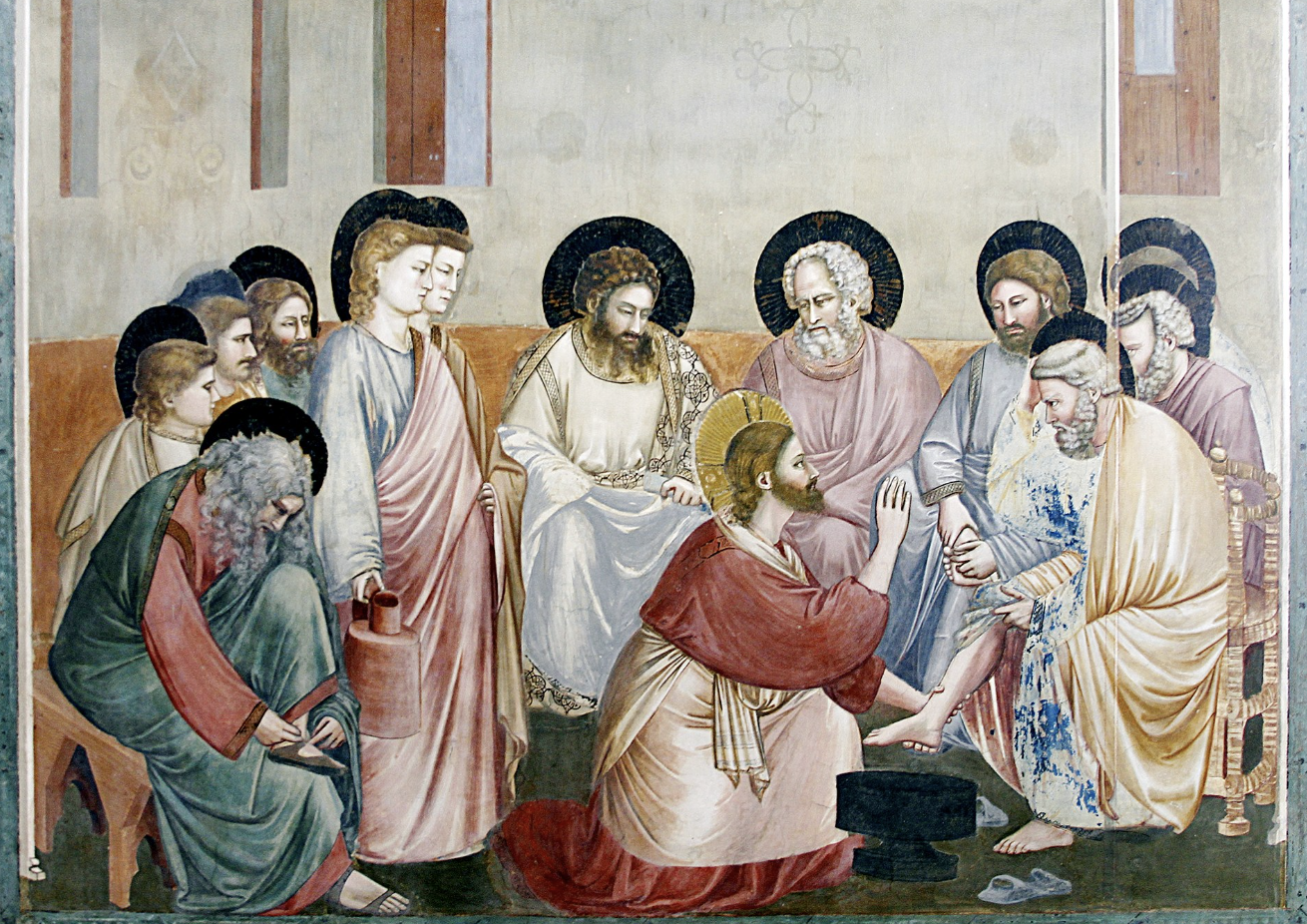
Three Jesus-centric commercials aired during the Super Bowl, breaking from the normal fare. One was for a recently launched Catholic meditation and prayer app called Hallow, while the other two were from the same advertising campaign: He Gets Us. The first of the two asked a question – “Who is my neighbor?” – and then showed images of individuals that many Americans may consider unsavory: a weathered man smoking in a bar, a trans person, a wealthy woman in fur, a convenience store employee, a disheveled homeless woman. The ad came and went. The second one, however, did not.
The minute-long ad showed still frames of various people in various situations with one uniting image: someone is washing someone else’s feet – a la Holy Thursday. The ad seemed uniquely created and aired to start a discussion, though it received ire from both sides of the political aisle, from religious and non-religious alike. Some folks called it too religious while others claimed it wasn’t Christian enough, or was somehow incorrectly Christian. The discussion continued online in the ensuing weeks and months. The commercial cost roughly 14 million dollars to air and shows a simple interaction between people who are perceived as being opposite of one another: son and father, a Black man and a police officer, an artsy teen and a popular one, a Native American and a White man, a young woman outside a family-planning clinic and an older woman who seems to have walked over from a line of protestors, an oil man and a clean air protestor, a migrant and a suburban woman, a queer individual and a Catholic priest, and more. The tagline, big bold letters on a black screen, said, “Jesus didn’t teach hate,” then, “He washed feet.” The ad received so much attention and the commentary kept going because it presented a challenging version of what it means to be Christian. I read multiple articles and comments where people complained how sinners are sinners and how this level of compassion effectively condones those sins. Some people saw the message as too “woke.” People on the conservative end of the spectrum derided the nonprofit for spending their money frivolously when it could be going directly to people in need.[5] Liberal-minded folks condemned the nonprofit for where its funding came from and for trying to push the message of “Jesus” on a growingly nonreligious public during a sporting event that has been called America’s second-biggest secular holiday. They also found fault with the amount of money spent by what’s deemed a “charitable” organization. If the goal of the He Gets Us campaign was to start a conversation, it worked.
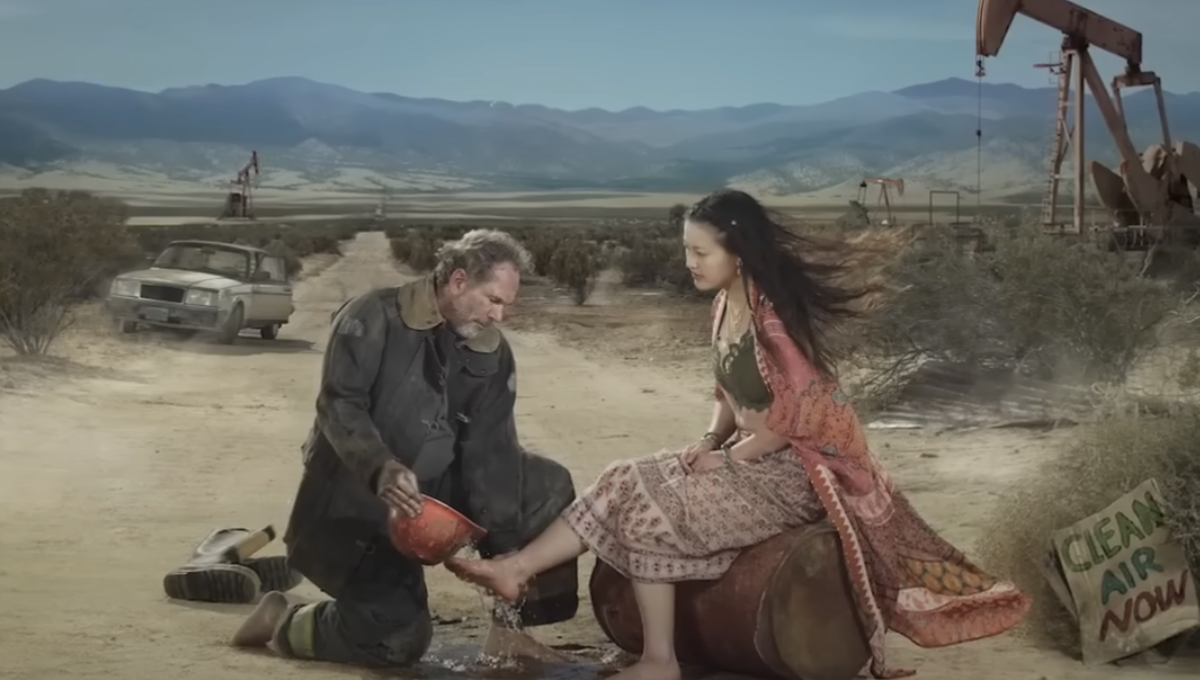
I thought about the visuals and message of the ad, thought about the Gospel reading at mass that morning. The lepers were shunned by society, and Jesus touched them. The ads urged people to serve their neighbor regardless of who they were.
In church, as one, we prayed: “Our Father, who art in heaven, hallowed be thy name; thy kingdom come, thy will be done on earth as it is in heaven. Give us this day our daily bread, and forgive us our trespasses, as we forgive those who trespass against us; and lead us not into temptation, but deliver us from evil.”
The last commercial about Jesus, the one for the Hallow app, had Mark Wahlberg urge viewers to, “Stay Prayed Up.” Classic Wahlberg. Mark Wahlberg blessed himself with holy water and sat alone in a church. The edit moved through various prayerful scenes: a family at dinner, soldiers near a battlefield, the actor from Chosen receiving ashes on his forehead, an Ash Wednesday ritual. A quick clip of football fans celebrating finished out the montage, though that felt like a blasé attempt to link the ad to the sporting event it was playing during instead of to the prayerful clips of the commercial. Mark Wahlberg has an admittedly complicated past as he was both a celebrity and a convicted felon by the time he was 20 years old. He’s had to live his entire adult life as a convicted felon as a result of things he did in his mid-teens. That reality, however, has not stopped him from becoming a household name and a mostly beloved actor. Now in his fifties, it is interesting to see him praying on television, and encouraging others to do so. Hallow was using the timing of the Super Bowl, right before Lent, to draw subscribers. A free trial would allow, and encourage, Christians to pray all the way through Lent. They advertised a variety of ways to engage. One of the offerings on the app was a guided audio version of the Rosary, led by Mark Wahlberg himself. I found this melding of celebrity and religion sort of jarring.
Shortly after the Lord’s prayer, the congregation at Mass offers each other the sign of peace. This can take many forms. People shake hands, wave to one another, nod or bow, and sometimes even ignore those around them. Bright sunlight filtered through the stained-glass windows behind me and a man who had turned in my direction got distracted by the ring on his finger. He stared at it while offering me peace, instead of making eye contact. The winners of the Super Bowl, the players and staff and executives and who knows who else, receive rings in acknowledgement of their efforts and victory.
Song #713 in the Warship/Worship Hymnal, “Eye Has Not Seen,” played while the congregation filed forward in an orderly fashion to receive Communion. “When pain and sorrow weigh us down, be near to us, O Lord / Our lives are but a single breath, we flower and we fade.”
After Communion, the Deacon cleaned the chalice used to hold the Precious Blood of Jesus. This task is often done with the utmost care and attention. The effort reveals the thoughts of whoever performs it. Some believe that they are truly touching Jesus and they do so with care, tenderness, and intensity. To miss a drop would be disrespectful, if not sacrilegious. The Deacon ran the white cloth along the edges, down into the bowl of the chalice. He inspected his work. Satisfied, he set both cloth and cup aside so the altar server could collect them from the altar and place them closer to the back.
The meal was complete. And everyone took a seat.
Concluding Rite
To be honest, I didn’t watch the entire football game. It was all too much and I needed a break. I had tried my best to make it through, to let it wash over me, but there was a lot to feel icky about. After I turned it off, I spent some additional time with my family. That was nice. The Super Bowl brought us together for a night and that was the main positive of the entire event for me. I got to sit with my soon-to-be wife and my mother and father in a warm house on a dark February evening. People rate this as a positive for sports in general, the idea that it can connect you to those around you and, most importantly, to your family. I’m not doubting this, but is everything else that comes with the NFL worth it? There are a lot of things that bring families together, a lot of reasons to gather, way more than just a football game.
The priest gave the final prayer and the dismissal, telling us all to “go in peace.” A final song: “Joyful, Joyful, We Adore You.” Brightly, the cantor and pianist found their rhythm and the priest led a procession toward the rear of the church.
Driving during the Super Bowl can feel lonely. There are very few other people out in the world. I made my way home and enjoyed the quiet of my own living room. My fiancé went up to bed and I checked my phone; I was curious who won. I learned that the game was actually still on, that there were 20 seconds left in overtime. I decided to turn it back on. Kansas City was on the verge of scoring. The camera showed a San Francisco fan at the game covering their face, unable to bear watching. In another section of the stadium, in a luxury box, a group of women held their hands over their mouths. The announcer said, “There’s a lot of praying going on around the country.” I decided to think about this statement. With so many folks glued to their televisions, was this statement accurate? Was there a lot of praying going on? Clearly, he was referring to fans who wanted their team to win. The announcer snapped me out of my musing when he said, “The Niners have to guard these last ten yards with their life.” With their bodies, definitely. Could that cause issues with their life, of course. But were the players on the field really ready to die for victory, in any real sense? The NFL told its audience, and its players, that it was doing everything it could to keep players safe. It wouldn’t cost their life, announcer guy. The gameplay went on and Taylor Swift’s boyfriend’s team won, the yellow-and-red team.
Amid the on-the-field huballo, Patrick Mahomes, the flowering quarterback for the winning team, was stopped by a reporter and gave an on-field interview. Helmetless and elated to have won, a tasteful gold cross noticeably hung from a chain around his neck and dangled outside of his pads, atop his jersey. He then thanked God.
Before I turned the game off, an announcer stated that this was the 7th longest game in NFL history. Seriously. Depressed now, I turned the game off and went to bed. I could not watch the celebration, with its trophies and glitter.
Some lyrics from the Mass’s final song: “Hearts unfold like flow’rs before you, op’ning to the sun above. / Melt the clouds of sin and sadness; drive the dark of doubt away; Giver of immortal gladness, fill us with the Light of day!”
After the song ended, the congregation split into two groups: one fled, the other milled and chatted. I slunk out the side exit and walked home a different route than the way I came, being more of a loop hiker than an out-and-back guy. I dreaded what was to come, not yet knowing what the day held. I reminded myself to pay attention, to look for what spoke to me throughout the day and to let go of the rest. I thought a common thought I’d been having: it seems to me like the NFL is trying to commandeer Sunday, to wrest it away from religion, from God. What was once the Lord’s day, a day of rest, now feels like a party celebrating all things football for twenty-some Sundays a year. All day coverage exists most weekend days, from fantasy football reports to shows about the various money lines and prop bets a gambler can gamble on. The NFL has begun to colonize Europe, South America, and other continents as well: growing the brand. This means that games often start at 9:30 a.m. on the east coast and run through midnight. Do other people realize just how much of their lives this sport is asking of them?
Conversely, a Catholic mass is often only one-hour long. Super Bowl LVIII lasted four hours and six minutes from start to finish. On the Simpsons, when Marge tells Homer that “The Lord only asks for an hour a week,” he responds, “Well in that case, he should’ve made the week an hour longer. Lousy God.” This back and forth always makes me laugh. I don’t recall hearing one person complain about the length of the Super Bowl in the year since it happened, which makes me think we live in a world of Homer Simpsons. But I’m not here to tell anyone else how to spend their time. Instead, on my walk, I just took a deep breath and let it go.
Up ahead, in a small front lawn near my house, a house sparrow bounced in the dead grass and pecked at a damp, but firm, stalk of winter wheat about six inches long. The bird flung it ahead multiple times, trying to get it to land just right so it could lift it and balance it in its beak. It bounced again and scooped up the stalk, which was probably three times the length of its tiny body, and flew twenty or so feet ahead and landed. It was taking a break, adjusting the stalk again. It then flew off once again, leaving my sight. I saw it once more as I stepped onto my porch. It was up in a corner, in a nook, where a concrete pillar met the porch roof. It clung to the stalk of wheat and watched me walk by, ready to drop its bounty and fly off should I make any sudden move. After I passed by and went inside, I watched the sparrow from my window. It jammed the wheat atop other brownish strands of organic material, building a nest. It was creating a safe, warm place where it wouldn’t be assaulted by foul weather and other animals.
That night, in my cozy bed, I asked myself why I didn’t embrace that same strategy for myself. I could have created a safe, quiet space free from the assault of Super Bowl Sunday. Not watching the entire game was a good start, but I still let too many external stressors into my brain. Reflecting later on had allowed me to weed the good information from the useless. I knew what I’d keep for myself, what I’d write about, and what I’d let go of as quickly as possible. Maybe I was building my own nest as best I could, as best I knew how.
A smile crossed my lips right before I drifted off. I was thinking of Mark Wahlberg. He just wanted America to “Stay Prayed Up.”
And then, thankfully, the day came to an end.
[1] Capital “R” intended.
[2] Relaxed Guidelines is a great band name.
[3] Kellen Winslow Jr. was sentenced in 2021 to 14 years in a state prison after he was convicted in a jury trial in 2019 of rape, indecent exposure, and other crimes involving three women. His lawyer called CTE the “elephant in the room” during the trial. CTE is a degenerative brain disease linked to multiple powerful collisions involving the head, like those one experiences when delivering, or receiving, a crack-back block. He is currently incarcerated at a supermax prison in Southern California.
[4] Ash Wednesday is favorite. You stand in line. They smear ashes on your forehead and tell you you’re going to die one day. No notes.
[5] John Chapter 12, anyone?